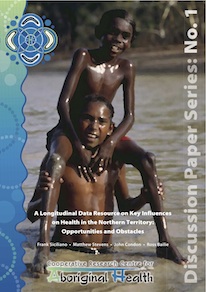A Longitudinal Data Resource on Key Influences on Health in the Northern Territory Opportunities and Obstacles
This is the first in the CRC for Aboriginal Health’s Discussion Paper Series. The purpose of this study is to increase understanding among researchers, health professionals, and government policy makers of the social and environmental determinants of health. Determinants include income, employment, education, housing, community infrastructure, social disruption, crime and violence.
This paper summarises the benefits and feasibility of a longitudinal database of socio-economic, environmental and health indicators at the regional and community level within the Northern Territory (NT): a Longitudinal Indicators Database (LID). It reviews literature as well as statistical initiatives currently underway, and involved a series of consultations with stakeholders. A statistical resource such as LID would facilitate both the monitoring of trends over time, as well as provide access to data to support applied research and inform policy makers and service providers.
The LID envisaged in this paper focuses on health, reflecting the work of the Menzies School of Health Research and the Cooperative Research Centre for Aboriginal Health. The study recommends that such a resource be seen in the context of a broader integrated information system of environmental, economic and social indicators, and encourages increased research–government collaborations in a number of sectors.
| Author | F. Siciliano, M. Stevens, J. Condon & R. Bailie |
|---|---|
| Type | Publications |
| Year | 2006 |
| Download |
 |

